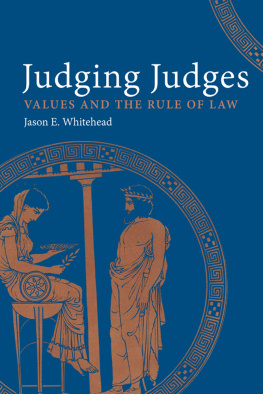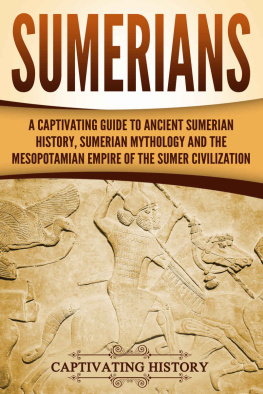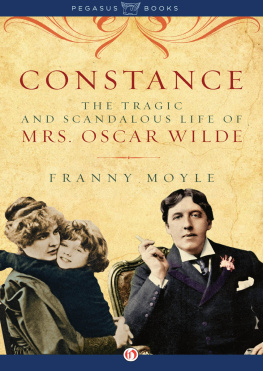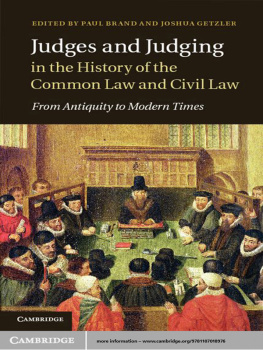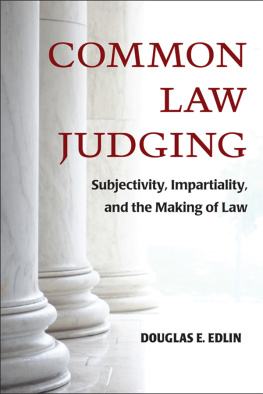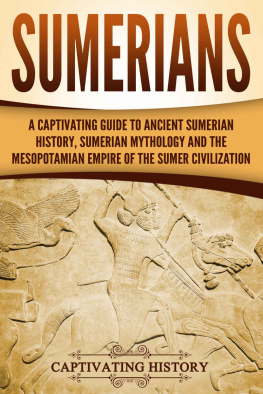
Table of Contents
FOR JENNIFER
INTRODUCTION
I N 1956, IN a village in Northern Rhodesia (now Zambia), a desperate woman sought help from a local tribunal made up of tribal elders in putting her marriage back on track. The relationship was in tatters. In recent months, both she and her husband had been diagnosed with a venereal disease. The husband insisted that it was she who had infected him, but she denied any infidelity and claimed he was at fault. He had threatened to stab her on one occasion and, worse, to use witchcraft against her. Yet none of that would have brought the couple to the tribunal had something more outrageous not happened, something so intolerable that the wife ran to court that very day: At dawn, she had awoken to find her husband with her breast in his mouth. She remembered his threat of witchcraft, and became terrified.
At the hearing, one of the elders demanded of the husband: [W]hat were you thinking of when you were sucking your wifes breast? Are you a small child, like that one [pointing to a baby in the room]?... Why did you do it?
The husbands reply only made his situation worse: It was love, he said.
The elder was incredulous. Love! You must be a strange person, practicing your love in that way while your wife was asleep. The elder and the husband went back and forth like this for a while, the husband protesting that he had merely been expressing tender affection for his wife while the elder became increasingly suspicious that the man was practicing sorcery. Finally, the elder said, No, no... I am afraid that if you went with your wife, you might try to kill her. The woman was placed in the protective custody of the police for the night, with more court proceedings to follow.
It was not the only time in mid-twentieth-century Northern Rhodesia that such disputes required court intervention. Another man had been accused of causing his wife to become infertile by sucking her breasts, and wives often ran to the courts to stop their husbands from performing cunnilingus on them or having intercourse with them while they slept. On other occasions, wives accused their husbands of stealing their menstrual cloths and using them as charms to bring success in gambling. The tribal judges took these accusations seriously. To them, taking a sleeping woman sexually was like making love to a corpse, while sucking a womans breasts at any time of day blurred the roles of adult and child. Cloths soaked with a womans menstrual blood were, in that society, not simple rags; they contained the awesome power of reproduction, which could be used for good or ill. To use such cloths for luck in gambling dens was to waste the procreative powers of the cosmos. In this context, the tribunals decision to post a guard to keep a breast-sucking husband away from his wife was a sensible response to an explosive situation.
The British colonial officials who reviewed the tribal decisions, however, shared none of these beliefs. They usually threw such cases out, reasoning that marital sex was the concern only of the husband and wife, for which court intervention was inappropriate. A man who enjoyed his wifes body while she slept was simply taking the erotic pleasure that was his due, and unless he used violent force the law had no role to play. All that talk about power and witchcraft and luck was quaint, but irrelevant. Local courts in the territory complained that the Europeans should be taking these cases seriously, but their protests went unheeded.
These incidents exist at the flashpoint between conflicting views on how the law should deal with sexual issues. To the inhabitants of Northern Rhodesia, it was not a question of prudishness, liberation, or even morality as such. Rather, sex was one of the underlying forces moving heaven and earth. Improperly conducted sex summoned danger and caused everyone harm. By barring such sex, they were protecting the entire society from catastrophe.
Lest anyone snicker at the hapless couple, we should recognize that the differences between modern and primitive views on sex and law are not so clearnot clear enough, at any rate, to merit smugness. Sex and lawsuits have gone hand in hand everywhere, in every era, and few sexual transgressions have ever been too small to merit the meddling of one tribunal or another.
The wife in the Northern Rhodesia incident fell through a late-colonial justice gap. Her case did not fit the 1956 Western model of what a sex claim should look like. Yet had she and her husband lived in Europe a few centuries earlier, when courts regularly involved themselves in bedroom behavior, she would have found a more sympathetic hearing: European records are full of cases in which married couples were accusedand accused each otherof sexual sorcery. The judges who punished such transgressors often justified their decisions as necessary to save society from Gods wrath. Indeed, dozens of sex acts in Renaissance Europe, both within and outside marriage, were believed to provoke divine vengeance. Sexual behavior was everyones business because one persons sexual missteps, if bad enough, could cause war, famine, and hails of fire and brimstone.
Moreover, had the aforementioned African couple been students, married or not, at any number of present-day U.S. colleges, the wifes claim might well have been enthusiastically received. Many postsecondary institutions have adopted elaborate rules governing their students sexual conduct, which they enforce with the zeal of the most devoted officers of the Inquisition. Gettysburg Colleges 2006 student handbook requires that all sex be consensual, which it defines as willingly and verbally agreeing (for example, by stating yes) to engage in specific sexual conduct. The handbook also prohibits the erotic touching of peoples bodies while they slumber. Thus, a man wishing to initiate sexual contact with a sleeping woman would need to wake her up, make sure her judgment is clear, and then ask (for example), May I suck your breast now? If he does not do so, he stands to be expelled from school and reported to the police.
The Antioch College Sexual Offense Prevention Policy of 2006 follows a similar line, although it is more detailed. Grinding on the dance floor is not consent for further sexual activity, warned the policy; neither are body movements or non-verbal responses such as moans. Sex is forbidden with any person who is asleep, intoxicated, or suffers from mental health conditions.
American university sex codes have been ridiculed as overly prudish, and college disciplinary boards mocked as kangaroo courts, but they are not going away. In fact, they recently became more accommodating forums for sexual misbehavior claims. In 2011, the U.S. government informed publicly funded universities that accusers in sex cases must win if it can be shown by a preponderance of the evidencethat is, a mere 51 percent likelihoodthat misconduct took place, despite the fact that the question of sexual wrongdoing often turns on the murky task of defining the power relationships between the people involved. (In U.S. criminal courts, the standard of proof is beyond a reasonable doubt.) Duke Universitys rules add to the ambiguity by stating that sexual misconduct may exist where there are real or perceived power differentials between individuals that may create an unintentional atmosphere of coercion. How anything resembling justice can be dispensed under these standards is difficult to imagine.
REGARDLESS OF THE setting, no one questions the laws primary role in resolving sexual conflicts. A person violating the shifting rules of sexual conduct in modern Western societies will not be accused of witchcraft, but that is often just a matter of terminology. Anyone, no matter how highly placed, who engages in sexual contact that is out of sync with prevailing attitudes risks being demonized and steamrolled in public by the legal system. Consider the boorish men of influence who are caught taking what they see as the perquisites of their positions. The prominent French economist and politician Dominique Strauss-Kahns allegedly violent sexual encounter with an African immigrant maid in a New York hotel suite quickly became an international incident in which the limits of class privilege were much discussed, especially in France. President Bill Clintons dalliances with a White House intern, revealed in an unrelated sexual harassment case against him, resulted in his impeachment in 1998 by the U.S. House of Representatives (though he was acquitted by the Senate). Polish-French film director Roman Polanski, on the run since his well-publicized 1978 California conviction for having sex with a thirteen-year-old girl, again became a universal symbol of criminal sexual excess when he was arrested in 2009 by Swiss authorities at the request of U.S. authorities. (He was later released.) Even powerful corporations get tagged for inadvertent transgressions. The fleeting exposure of singer Janet Jacksons breast during the 2004 Super Bowl telecast resulted in more than $500,000 in government fines against the network that aired the game, CBS, and years of wrenching litigation over sexual decency on the American airwaves.
Next page



